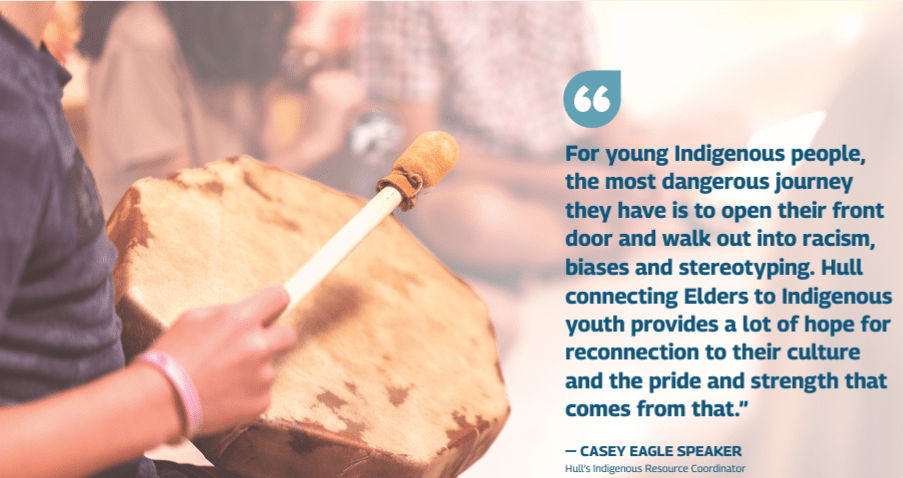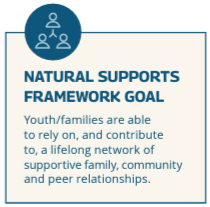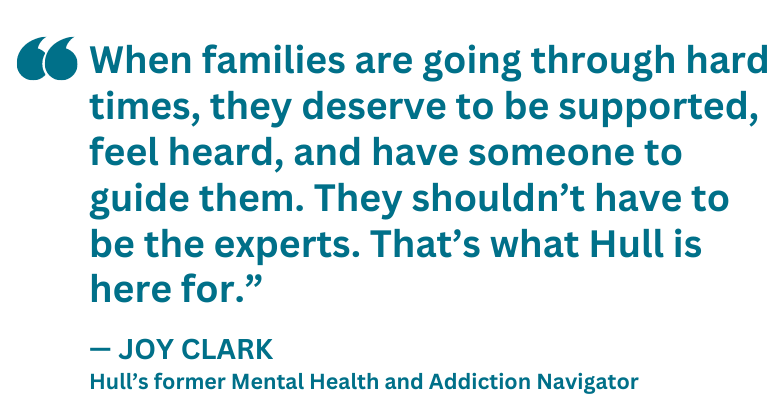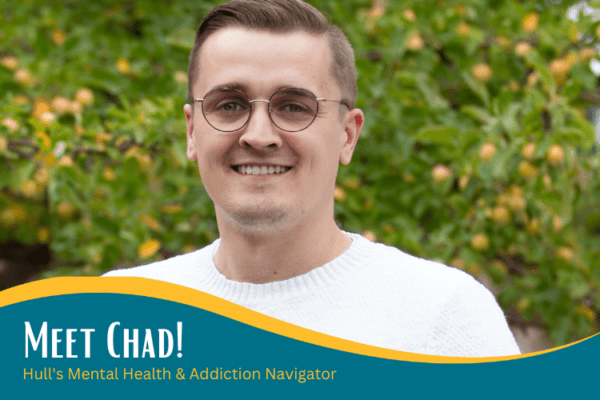Fostering connection and belonging is a pillar of our work at Hull
It is tantamount to safety and treatment and is what makes our lens and support so comprehensive. We build a safety net around the young people and families we serve to help support them on their healing journey and into the future.
HEALING CONNECTIONS: THE POWER OF ELDERS

Hull is fostering connections with Elders as an instrumental piece in promoting wellness for Indigenous young people and their families, through connecting them to their heritage and building community and supports.
Like most of Canada, Indigenous youth are over-represented in Alberta’s child welfare system. Many of them carry intergenerational trauma as a result of their parents, grandparents, and great grandparents being denied their rights, forced into residential schools, and made to feel shame for their culture, the color of their skin and the language they spoke. As a result, many of these youth were raised away from their communities or had minimal connection to their heritage.
“The highest percentage of youth caught up in the child welfare system in Alberta are Indigenous, yet they make up the smallest percentage of our province’s child population,” says Casey Eagle Speaker, Hull’s Indigenous Resource Coordinator. “Many of these youth don’t have a sense of culture or a sense of belonging. Hull is working with Indigenous Elders in the community to connect these youth to their roots and their culture as an important piece to start changing that tide. Reconnection with culture is a major part of the healing journey.”
Having connections with Elders and a strong relationship to the Indigenous community is critical to the work our Agency does. The traditional role of Elders in the community is as wisdom keepers. Essentially it is their life’s work to teach and pass on traditional ways of being, knowing, and doing. Central to these ways is the idea that once entering into this learning relationship (or “making relatives”) a person is considered family. The relationships the young people at Hull form with Elders are life-long connections and critical for their healing journey. In Eagle Speakers’ words, Elders are equivalent to PhDs of the western world. Elders have the knowledge and wisdom to teach their cultures, support youth in their development, and help them overcome challenges and trauma such as addiction or sexual exploitation.
These Elders give immensely of their time and knowledge, making themselves readily available to Hull. Eagle Speaker is continuously recruiting Elders for different programs and notes that he has never had an Elder refuse to work with us when asked to do so. They connect with our youth and talk about values and beliefs. They encourage pride, honor and respect in relation to their Indigenous roots. With patient, consistent and repeated connection with Elders, the Indigenous youth and families we serve begin to develop a sense that it’s okay to be who they are — whatever culture that is.
Elders working with Hull represent diverse cultural groups such as Stoney, Tsuut’ina, Cree, Blackfoot or Métis. When Elder connections are being made for the young people at Hull and there isn’t one from their own cultural group, they are guided to find a highly recognized Elder in their home community. Often, they choose to maintain a connection with the initial Elder as well. The key is building connection and relationships.
Elders are embedded in everything we do at Hull, from our school to our programming to training our staff. The relationships that families seek and build with Elders through our Braiding the Sweetgrass program extend well past the duration of the program itself. Elders are an integral part of the working group that is developing Hull’s Indigenous Strategy in support of the Agency’s commitment to honouring the path of Truth and Reconciliation in all our work. As well, Elders sit on Hull’s Indigenous Advisory Council (HIAC) in its mandate to help align programming with Indigenous ways of being, knowing, and doing.
“Elders provide us guidance and support in so many ways,” says Eagle Speaker. “They are a crucial element at this point in time for inclusion. Hull has a very open mind and heart to say we need to be a part of this and that we want to walk this journey with Elders and let them guide us.”
Eagle Speaker also notes that Elders and the work they do are “major stepping stones” for youth and their families to reach their full potential. “Because of what has happened to Indigenous people, they have a strong belief they are undeserving. Elders bring knowledge and a sense of a pride. Connecting our youth to them brings hope that future generations will not have to go through this. It also opens a corridor that Indigenous culture will be carried forward by these young people.”
NATURAL SUPPORTS FRAMEWORK: BUILDING CONNECTIONS BUILDS SUPPORT
A house without a framework and a foundation would topple to the ground as their purpose is to keep the house even and supported. The Natural Supports Framework acts in the same manner for the young people and families accessing our services.
The Natural Supports Framework is a model of practice and training that encourages us to connect to those already in an individual’s life, biological or not, and provide them the necessary skills to be supports. Hull works to build capacity with those connections — whether aunts, uncles, coaches, teachers, family friends, etc. — and decrease the need for professional supports. Essentially, we are creating a foundation to hold them up and a safety net to catch them if they fall once they have transitioned out of our Agency’s services.
One of the guiding principles of the framework, is we treat connection to natural supports with the same urgency as food, shelter and clothing needs.
Hull began using the Natural Supports Framework in our community programming, and based on its success implemented it across all Hull programs. It is now the cornerstone of the work we do and essential to successful outcomes, transitions from services, and futures for those vulnerable children and youth we work with.
An important part of the process is asking these young people what they need from the people in their lives and if those needs are being met. We look at who is in the young person’s life, assess those relationships and determine if those connections are willing to take on an even more involved and supportive role. If they are willing, we then provide training and support back to them. We also work with a “do with, not for” guiding principle — respecting the autonomy of young people/families and their natural supports.
“Everyone needs lifelong supports. That’s a part of a functioning society,” says Dave Maclean, Hull Services, Natural Supports Trainer. “We acknowledge that Hull can’t be the long-term solution for these young people. A critical part of our role is connecting them to supports, building capacity and then stepping back at the appropriate time.”
Creating and incorporating natural supports for these young people is a key component of the safety plans Hull creates to carry the young people we work with past our involvement. This type of life-long support is essential to their futures.
“When these vulnerable young people know they can build healthy relationships and turn to those connections in times of need, it is hugely rewarding for them,” says Christen Terakita, Hull Services, Natural Supports Trainer. “Everyone matters to someone. We just help them find those people.”
HELPING FAMILIES NAVIGATE THROUGH DIFFICULT TIMES
Hull’s Mental Health and Addiction Navigator role is one part triage, one part detective and one part Sherpa. These all combine into a human resource for families who don’t know where to turn in times of mental health and addiction concerns and crisis with their kids.
Our Mental Health and Addiction Navigator helps parents and caregivers identify the best resources and supports available to them in their community, provides guidance on how to navigate those resources, and is available for ongoing support to help people through their journey. Finding the right supports at the right time in a complex system can be daunting and frustrating — particularly during a very stressful time. And while we live in an age where Google provides a lot of our information, there are certain things an online list can’t provide.
“We offer families relief that they aren’t walking and searching alone anymore. We are here to support them and give them an actual person to talk to,” says Joy Clark, Hull’s former Mental Health and Addiction Navigator.

Clark often takes calls from worried family members or caregivers who know their young person is struggling with something but aren’t sure what it is or where to turn.
“It can be difficult to find the right service when you aren’t exactly sure what the problem is. I encourage people that they don’t need to figure that out. I just need to hear their story. My job is to sort out what the issue might be and where to turn,” explains Clark. “I look to what services are a good fit for both the immediate and the long term.”
Our Mental Health and Addiction Navigator also determines who needs support and service right away, and who needs less immediate support. Regardless, no one’s situation is diminished and everyone receives help — at no cost.
“When your child is hurting, it is a crisis and emergency to you,” explains Clark. “I want to make sure families don’t feel like they can’t call if they feel the issue is not severe enough. The earlier you reach out for support the more options you have.”
Our Mental Health and Addiction Navigator also helps those in crisis remove possible barriers to support. Those access barriers could come in the form of excessive waiting lists, transportation challenges or unanticipated financial costs. The Navigator identifies other resources and support options to better meet the family’s needs. In some complex situations, families may have already accessed all available self-referral options and we help advocate for them to access other systems. Perhaps they need a family doctor referral and we work with them on what to say to get support. Hull helps look at things from a different perspective and advocates in a different way.
In what can be a very isolating time in a young person’s and their families’ lives, Hull helps provide the important connections they need.
Reach Out Anytime
If you know a young person that needs mental health or addiction support, reach out to us. If you aren’t sure if you should call because things aren’t “bad” enough, reach out to us. If you don’t know exactly what you are looking for, but know you need support, reach out to us.
Hull’s Mental Health and Addictions Navigator is here to listen to your story and help you navigate the support you may need.
Reach Out
